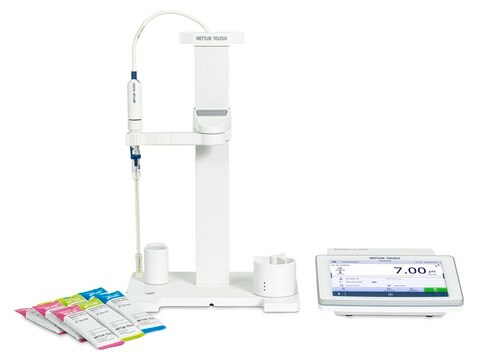MT51343201
Mettler-Toledo InLab® redox Pro ORP electrode
Redox Electrode with Platinum Ring Indicator and Movable Glass Sleeve Junction
Zaloguj sięWyświetlanie cen organizacyjnych i kontraktowych
About This Item
Kod UNSPSC:
39121436
NACRES:
NB.79
Polecane produkty
Materiały
glass shaft
opis
Reference electrolyte 3 mol/L KCl
Reference system ARGENTHAL™ with Ag+ -trap
S7 connection
Without cable
producent / nazwa handlowa
Mettler-Toledo 51343201
zakres pomiaru temperatury
0-100 °C
dł. × śr.
100 mm × 6 mm
Opis ogólny
Mettler Toledo InLab® Redox Micro is A combination electrode for measuring the oxidation/reduction power of a solution. Consists of a platinum ring indicator electrode and a silver/silver chloride reference electrode.
The measuring signal is produced on the surface of the precious metal by an exchange of electrons with the oxidation-reduction system of the measured medium.
The combination design avoids use of separate reference and indicating electrodes.
The Toledo InLab® Redox Micro electrode has the innovative Safelock closing ring which gives easy access for re-filling reference electrolyte and complete sealing when closed.
Different cables can be connected to the S7 screw head allowing use with a wide range of meters.
The measuring signal is produced on the surface of the precious metal by an exchange of electrons with the oxidation-reduction system of the measured medium.
The combination design avoids use of separate reference and indicating electrodes.
The Toledo InLab® Redox Micro electrode has the innovative Safelock closing ring which gives easy access for re-filling reference electrolyte and complete sealing when closed.
Different cables can be connected to the S7 screw head allowing use with a wide range of meters.
- Combination design
- Safelock closing ring
- Detachable cable
Informacje prawne
ARGENTHAL is a trademark of Mettler-Toledo, Inc.
InLab is a registered trademark of Mettler-Toledo, Inc.
produkt powiązany
Kod klasy składowania
12 - Non Combustible Liquids
Klasa zagrożenia wodnego (WGK)
WGK 1
Temperatura zapłonu (°F)
Not applicable
Temperatura zapłonu (°C)
Not applicable
Certyfikaty analizy (CoA)
Poszukaj Certyfikaty analizy (CoA), wpisując numer partii/serii produktów. Numery serii i partii można znaleźć na etykiecie produktu po słowach „seria” lub „partia”.
Masz już ten produkt?
Dokumenty związane z niedawno zakupionymi produktami zostały zamieszczone w Bibliotece dokumentów.
Nasz zespół naukowców ma doświadczenie we wszystkich obszarach badań, w tym w naukach przyrodniczych, materiałoznawstwie, syntezie chemicznej, chromatografii, analityce i wielu innych dziedzinach.
Skontaktuj się z zespołem ds. pomocy technicznej




